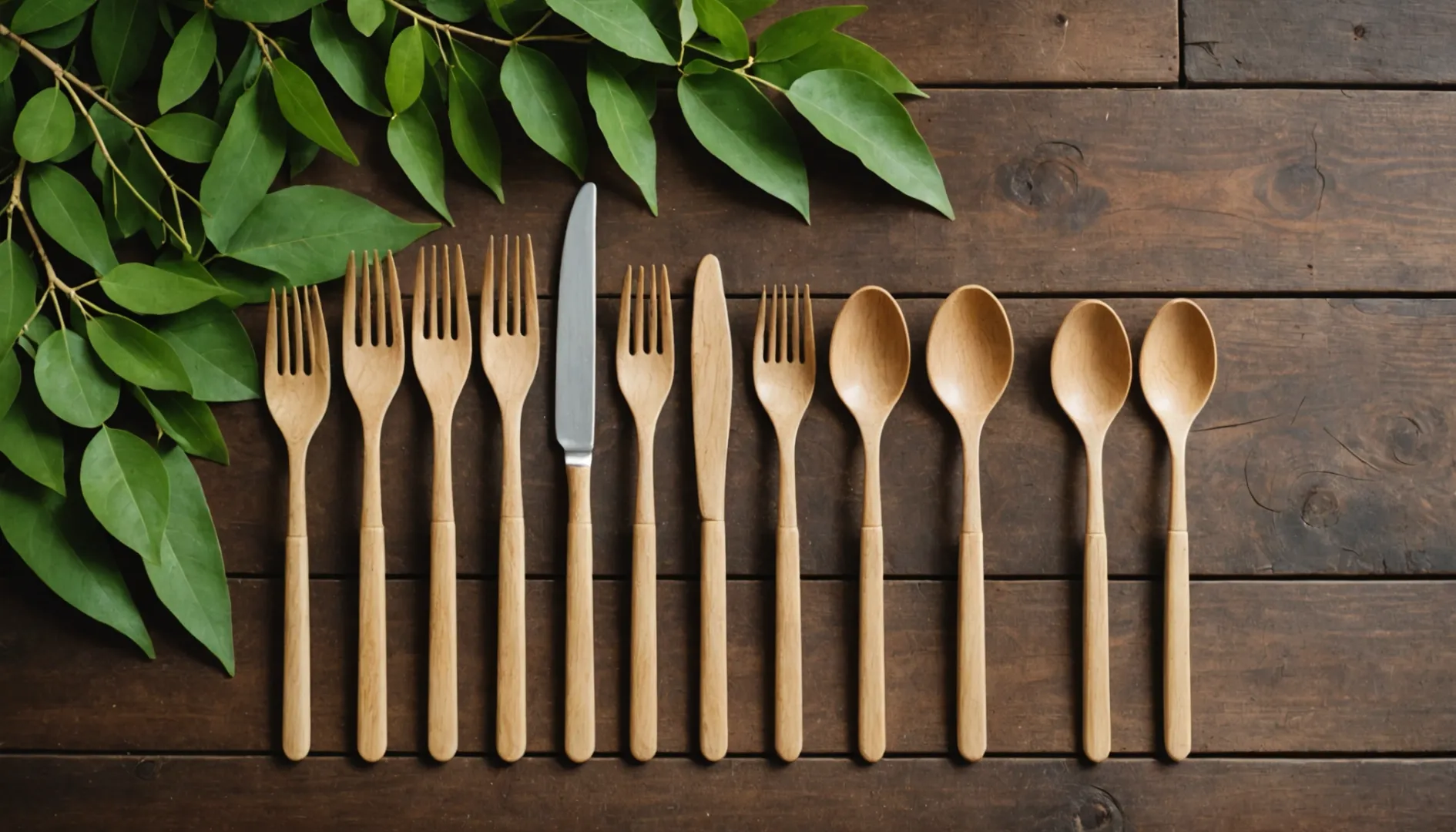
Every time I reach for disposable wooden cutlery, I wonder if it truly lives up to its eco-friendly promise. Can it really break down and benefit the earth?
Disposable wooden cutlery is indeed fully compostable under the right conditions. Made from materials like birch and bamboo, these utensils can decompose in about 90 days in a composting environment, enriching the soil and promoting plant growth.
I've always been fascinated by how something so simple can contribute positively to our planet. But there's more to composting than meets the eye. Beyond tossing them into a compost bin, ensuring optimal decomposition involves understanding the conditions that help break these utensils down effectively. Let's delve into how temperature, moisture, and oxygen play pivotal roles in this process and see how wooden cutlery measures up against other materials. Plus, I’ll share some practical tips from my own trials to help you maximize your composting efforts at home.
Wooden cutlery decomposes in 90 days in compost.True
In composting environments, wooden utensils decompose within approximately 90 days.
Bioplastics decompose faster than wooden cutlery.False
Bioplastics require industrial conditions, whereas wooden cutlery decomposes naturally.
What Makes Wooden Cutlery Compostable?
Ever wondered why wooden cutlery is considered a green hero in the fight against plastic waste?
Wooden cutlery is compostable because it is made from natural materials like birch and bamboo that decompose under conditions of warmth, moisture, and oxygen.
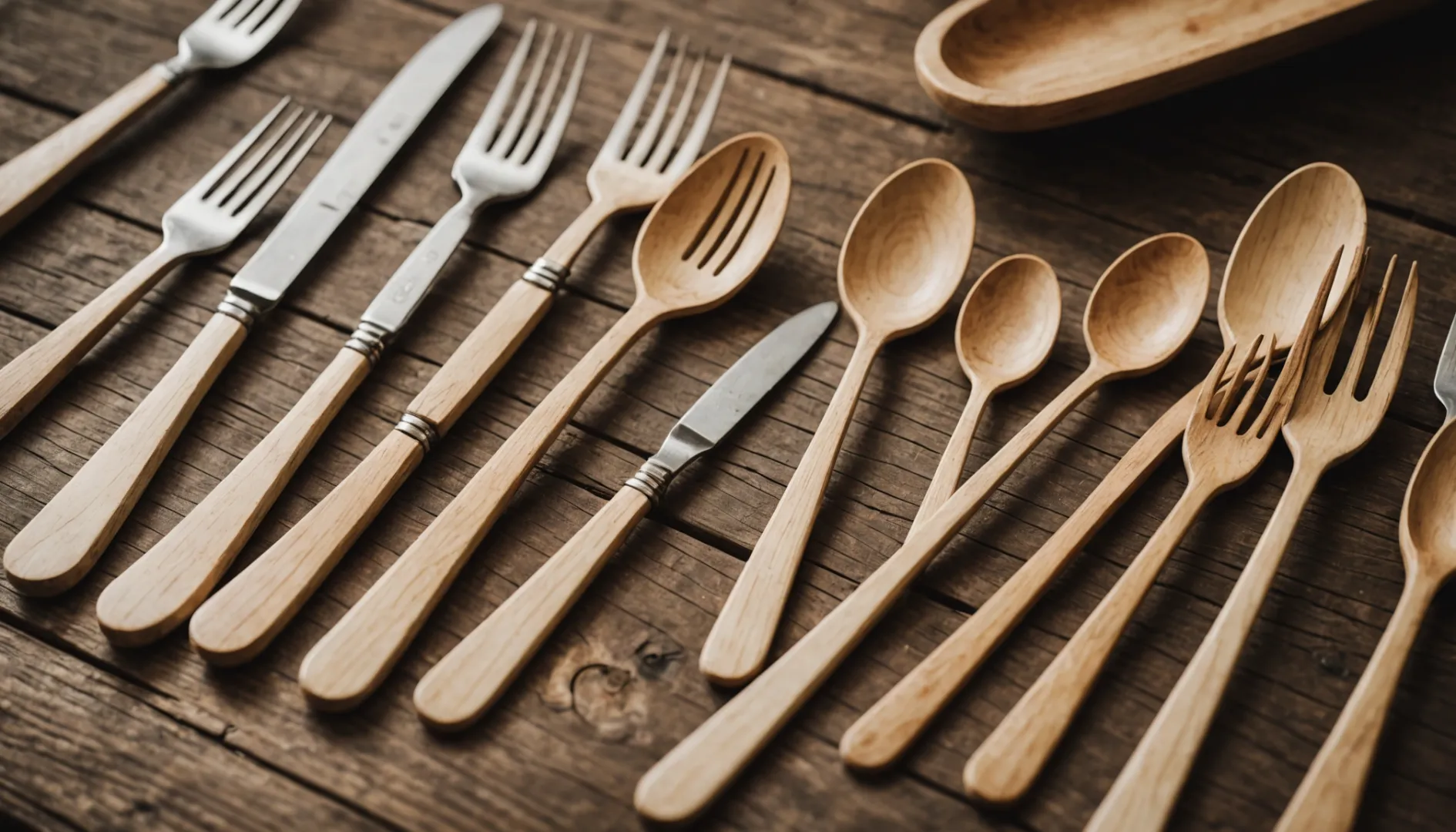
Material Composition and Sustainability
You know, when I first switched to wooden cutlery, I was surprised by how sturdy and stylish they were. Turns out, they are crafted from fast-growing trees like birch and bamboo. These trees grow super fast, which makes them a sustainable choice. Plus, when they come from responsibly managed forests, like those certified by the Forest Stewardship Council (FSC), I feel like I'm doing my bit for the planet every time I use them.
Decomposition Timeline
I remember when I learned that under the right conditions, wooden utensils can break down in about 90 days. It blew my mind! This happens in commercial composting facilities where the temperature, moisture, and oxygen levels are just right. In my own backyard compost pile, it might take a bit longer—up to six months—but knowing that I'm turning my cutlery into nutrient-rich soil is pretty rewarding.
Conditions for Effective Composting
For wooden cutlery to break down efficiently, here's what I've discovered needs to happen:
- Temperature: It needs to be warm enough to get those microbes working.
- Moisture: Keeping things damp helps break everything down.
- Oxygen: Airflow is crucial for aerobic decomposition.
While I can manage these conditions in my backyard compost pile, commercial facilities do it faster and more efficiently, which is great if I'm in a hurry to see results.
Comparison with Other Materials
One of the things I appreciate about wooden cutlery is how easy it is to dispose of compared to bioplastics like polylactic acid (PLA). Those require industrial composting facilities, but wooden cutlery can usually be composted at home. Its natural look makes it easy to spot and toss into the compost bin without worrying about mixing it up with non-compostable items. Choosing wooden utensils1 feels like a small yet significant step towards reducing waste and supporting a healthier planet. Embracing wooden utensils not only supports waste reduction but also enriches soil health when returned to the earth through composting.
Wooden cutlery decomposes within 90 days in compost.True
In optimal composting conditions, wooden cutlery can decompose in about 90 days.
Bioplastics decompose faster than wooden cutlery.False
Bioplastics need industrial conditions to decompose, often slower than wood.
How Does Wooden Cutlery Compare to Bioplastics in Composting?
Ever wondered if that wooden fork is actually greener than its bioplastic cousin? Let's dig into the composting secrets behind these eco-friendly warriors.
Wooden cutlery is generally easier to compost at home, breaking down naturally with minimal fuss. Bioplastics, however, often need industrial facilities to decompose, making wooden options more convenient for eco-conscious users.
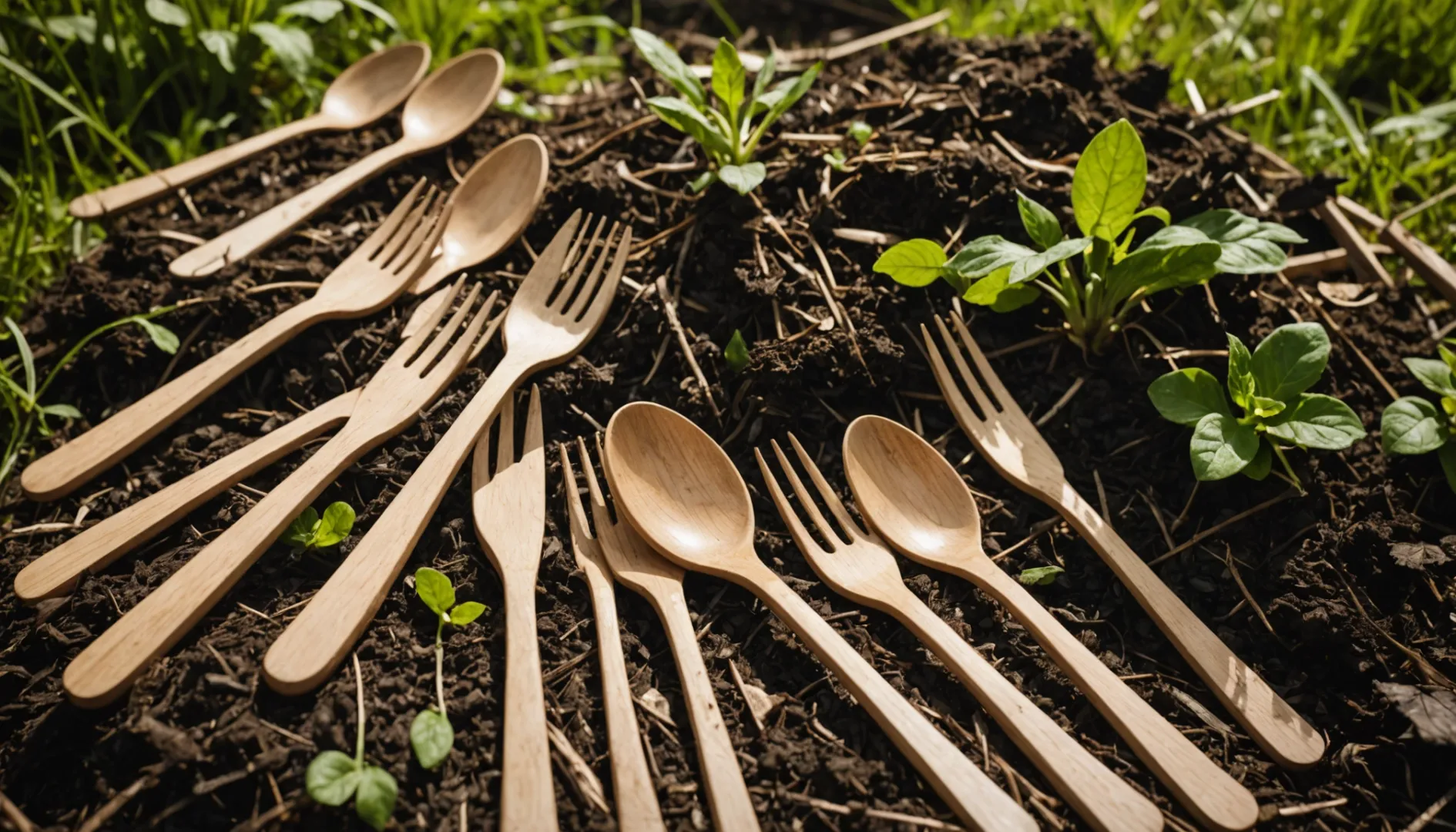
Material and Composition
When I first stumbled upon the idea of swapping out my regular utensils for something more sustainable, I was drawn to the simplicity of wooden cutlery. Imagine holding a spoon made from birch or bamboo—materials that not only hail from sustainable forests but also feel like an embrace of nature itself. These choices are not just about functionality; they add a touch of nature's elegance to every meal. And when it comes to composting, they break down just as gracefully, leaving nothing behind but enriched soil. Bioplastics, like PLA (polylactic acid), have their own charm—they’re derived from renewable resources like corn starch—but they demand specific conditions to vanish without a trace.
Composting Conditions
I remember setting up my first compost bin in the backyard. It was a bit like nurturing a pet; getting the temperature, moisture, and oxygen levels just right felt like creating a micro-world that thrived with life. With wooden cutlery, I saw results within three months. I’d toss in those used forks and spoons, and soon enough, they were back to being part of the earth. On the flip side, bioplastics2 left me puzzled. They needed a high-tech compost facility to disappear effectively, something far beyond my humble backyard setup.
Environmental Impact
The real magic happens when you see how wooden cutlery supports the earth. Every piece that decomposes is like a gift back to the soil, nurturing new life. Bioplastics do cut down on fossil fuel use—a win in its own right—but without proper disposal, they risk lingering in landfills, thwarting their eco-friendly promise.
Ease of Disposal
Sorting waste has always been a family affair for us. The wooden forks and knives were easy heroes of this story—they looked different enough from regular plastics that even my kids could sort them out correctly. Bioplastics3, though, tended to sneak into the wrong bins more often than not. They blend in too well with their non-compostable counterparts, which can complicate disposal efforts.
In conclusion, while both wooden cutlery and bioplastics strive for sustainability, wooden utensils offer a more straightforward path for those of us looking to make small yet impactful changes in our everyday lives. The simplicity of tossing them into a home compost bin without second-guessing feels like a small victory for the planet.
Wooden cutlery decomposes in 90 days in compost.True
In a composting environment, wooden cutlery can decompose within 90 days.
Bioplastics decompose faster than wooden cutlery.False
Bioplastics require specific conditions and often take longer to decompose.
How Can I Successfully Compost Wooden Utensils?
Ever stared at a pile of wooden utensils and wondered how to compost them effectively? Let's explore how to transform these eco-friendly tools into nutrient-rich soil.
To compost wooden utensils effectively, ensure a warm temperature, adequate moisture, and sufficient oxygen. These conditions boost microbial activity, accelerating decomposition. Under optimal conditions, wooden utensils can break down in about 90 days, making them a great choice for eco-conscious waste reduction.
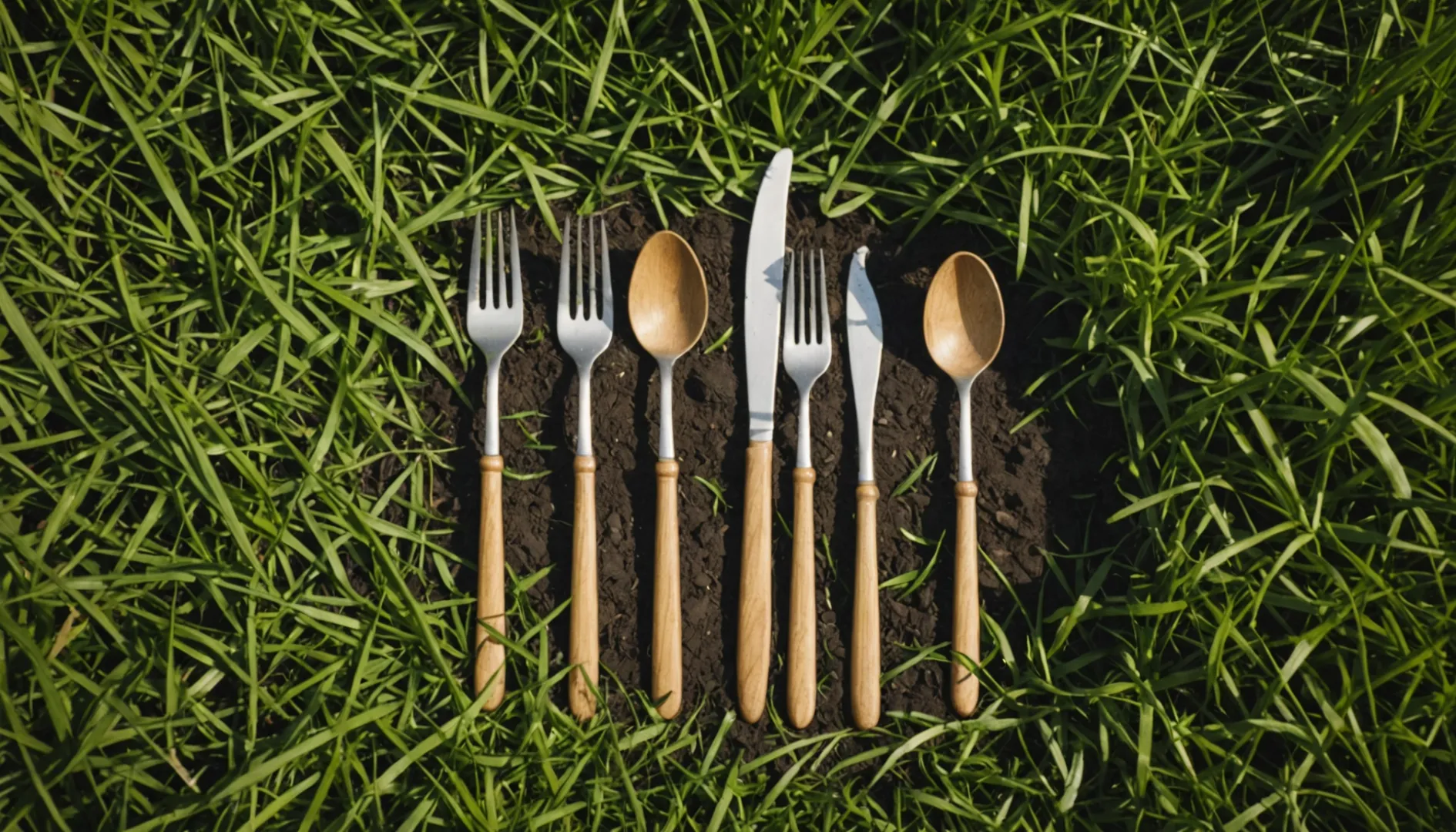
Importance of Temperature in Composting
Temperature plays a critical role in composting wooden utensils. High temperatures, typically between 104°F and 140°F (40°C to 60°C), facilitate the growth of thermophilic microorganisms that break down organic material more efficiently. These temperatures can be achieved in commercial composting4 facilities or well-managed home compost piles.
I remember the first time I tried composting my wooden spoons at home. It was a bit of a learning curve! While I haven't yet tried a commercial composting facility, I've read that they manage these conditions much more efficiently than my backyard setup could ever dream of.
Role of Moisture in Decomposition
Moisture is essential to keep the microbial community active. Wooden utensils require a moisture level similar to a wrung-out sponge. Too much water can lead to anaerobic conditions, while too little can halt microbial activity. Regularly check your compost pile and adjust as needed to maintain ideal conditions.
Moisture is like the secret sauce of composting. When I first started, I had no idea that my compost pile needed to feel like a wrung-out sponge. If it's too dry, nothing happens; too wet, and it gets smelly. I've learned to check it regularly—almost like a little pet—and tweak things as needed to keep the balance right.
Ensuring Adequate Oxygen Levels
Oxygen is crucial for aerobic decomposition, which is more effective and faster than anaerobic processes. To maintain oxygen levels, turn the compost pile regularly. This ensures even decomposition and prevents foul odors often associated with anaerobic breakdown. Consider using a compost aerator5 to make this process easier.
Turning the compost pile was something I underestimated at first. It's not just about giving the pile some fresh air—it's about speeding up the breakdown process and avoiding any funky smells.
Comparing Composting Conditions
Wooden utensils can decompose in both home and commercial compost settings. However, commercial facilities provide optimal conditions that significantly speed up the process. In contrast, home composters should ensure that their piles are well-managed to mimic these conditions.
I've experimented with both home and community composting setups. While I've seen success at home, there's no denying that commercial facilities are like the superheroes of composting. Understanding these different compost methods6 has helped me make more informed choices on where to compost based on convenience and efficiency.
Wooden cutlery decomposes in 90 days in compost.True
In optimal composting conditions, wooden cutlery can decompose within 90 days.
Bioplastics decompose faster than wooden cutlery.False
Bioplastics require specific conditions and often take longer to decompose.
Can You Compost Wooden Cutlery at Home?
Ever wondered if your wooden cutlery can join the compost party at home? Let's explore together.
Yes, you can compost wooden cutlery at home if you maintain a balanced compost environment with the right temperature, moisture, and oxygen. These conditions help wooden utensils break down efficiently, adding valuable nutrients to your compost.
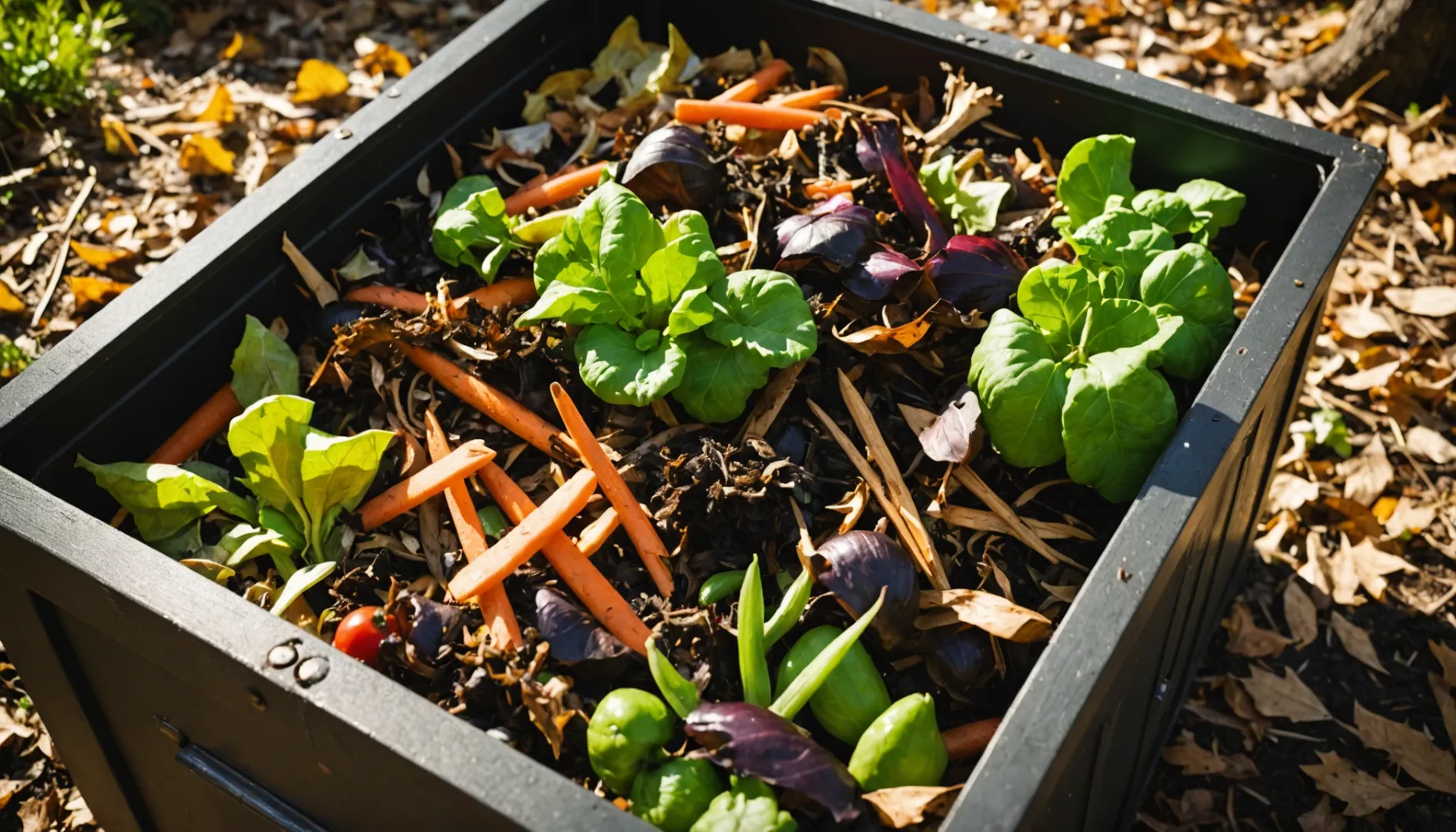
Understanding Wooden Cutlery Materials
I remember the first time I switched to wooden cutlery; it was a picnic in the park, and I was determined to make it as eco-friendly as possible. Wooden cutlery is usually made from fast-growing species like birch or bamboo. These materials are both sustainable7 and decompose well in home compost systems, provided they're untreated.
Optimal Conditions for Composting
To successfully compost wooden cutlery, you need to keep your compost pile just right. Picture it like baking bread – you need the right warmth and moisture to get that perfect rise.
- Temperature: Keep the pile warm to help those tiny microbes work their magic.
- Moisture: Think damp sponge, not soggy cereal.
- Oxygen: A regular turn of the pile helps keep everything breathing and breaking down nicely.
How Long Does It Take?
In my experience, under ideal conditions, wooden cutlery can decompose in about 90 days. But, like waiting for a good stew, patience is key if conditions aren't perfect. Cooler climates or less controlled environments might stretch this timeline out a bit. Unlike PLA bioplastics that need industrial composting8 facilities, wooden utensils are more forgiving.
Tips for Effective Home Composting
- Cut into Smaller Pieces: Just like chopping veggies, smaller pieces of cutlery speed up the process.
- Mix with Greens and Browns: Balance those carbon-rich spoons with some nitrogen-rich fruit peels for a healthy compost mix.
- Monitor and Adjust: Keep an eye on your pile and tweak moisture and air as needed.
Embrace these practices to make the most of your composting efforts at home. With a little care, your wooden utensils can contribute positively to your garden's ecosystem. Imagine the satisfaction of knowing your simple dinnerware choice is giving back to the earth!
Wooden cutlery decomposes in 90 days in compost.True
In a composting environment, wooden utensils break down within 90 days.
Wooden cutlery needs industrial composting to decompose.False
Wooden cutlery can decompose in backyard compost piles, not just industrial.
Conclusion
Disposable wooden cutlery is fully compostable in optimal conditions, breaking down within 90 days, enriching soil and providing an eco-friendly alternative to plastic utensils.
-
Discover why wooden utensils are a better choice for sustainability. ↩
-
Discover the specific conditions needed for bioplastic composting. ↩
-
Understand how bioplastics affect waste management and sustainability. ↩
-
Discover why commercial composting accelerates decomposition. ↩
-
Find tools that help maintain oxygen in your compost pile. ↩
-
Learn how different methods affect composting efficiency. ↩
-
Learn why birch and bamboo are considered sustainable options. ↩
-
Discover the specific conditions required for composting PLA bioplastics. ↩

